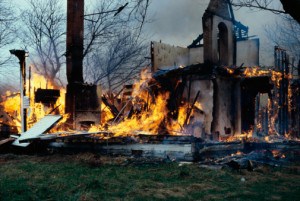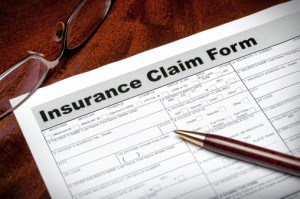 In our piece about homeowners’ policy exclusions, we listed “intentional acts” as one of the more common exclusions. Arson – the deliberate act of setting fire to a property – will normally fall under “intentional acts.” Insurance policies almost always cover fire, but there’s a huge difference between a grease fire in the kitchen and deliberately setting your own home aflame.
In our piece about homeowners’ policy exclusions, we listed “intentional acts” as one of the more common exclusions. Arson – the deliberate act of setting fire to a property – will normally fall under “intentional acts.” Insurance policies almost always cover fire, but there’s a huge difference between a grease fire in the kitchen and deliberately setting your own home aflame.
Under normal circumstances, if you set fire to your house, pay someone else to set fire to your house, or are in any way involved with the intentional burning down of your house, your claim will be denied. However, if someone sets fire to your home and you have no knowledge of the act, your insurance carrier should pay out on that claim.
Proving arson
Generally speaking, an insured is the party who must prove that the loss falls within the parameters of the policy, but the insurance company is responsible for proving arson. In other words, a policyholder must only show that a fire loss occurred during the term of the policy, and then the burden shifts to the insurance company to prove it doesn’t owe for the claim, i.e., arson. This can make it more complicated for policyholders to obtain a payout when their property has been deliberately burned by someone else.
In 2013, Brandon McWherter and Clint Scott represented clients whose insurance company denied their fire damage claim under a policy that insured against “accidental” direct physical loss. The insurance company claimed that the clients had committed arson and that the clients had the burden of proving the fire was “accidental” pursuant to the terms of the insurance policy. Proving a negative (that they didn’t burn it) can be different, but fortunately the Judge disagreed and ruled that policyholders only have to prove a fire occurred, and then the burden shifts to the insurance company to prove arson. When the case went to the United States Court of Appeals for the Sixth Circuit, the Court pointed out that it is presumed in Tennessee that “the burning of a property is the result of an accidental cause,” and that because someone else set fire to their home, they “accidentally” suffered a loss. This decision upheld the long-standing rule that insurance companies must prove arson occurred.
Additional complications
A story of California from 2012 highlights a particular type of complication that can arise out of an arson claim. A couple is on the verge of divorce and the wife wanted to remain in the family home. The husband set fire to that home, completely destroying it. The wife submitted a claim, which traditionally would have been denied; you cannot collect on a claim if the act was intentional, after all. But in this case, the wife was deemed an “innocent co-insured” and she was able to collect on her claim because of the wording of her policy.
This is one reason why more and more insurance companies are changing the language of their policies, to ensure that they will not have to pay out a claim if the intentional act was committed by “any” or “an” insured (as opposed the “the” insured, which can be interpreted differently).
The vast majority of homeowners do not expect someone to set fire to their property, intentionally or otherwise. Still, it is an excellent idea to review your policies with your agent and a skilled Tennessee insurance disputes attorney before you sign anything. At the Gilbert Firm, we uphold the rights of policyholders throughout the state and assist clients whose claims have been denied for unfair or unjust reasons. To work with an experienced Tennessee bad faith attorney from our firm, please call 888.996.9731, contact Brandon McWherter or Clint Scott, or use this contact form to schedule a consultation at one of our office locations in Nashville, Chattanooga, Memphis, Jackson or Knoxville.
 One of the questions we hear a lot from policyholders whose claims have been denied is, “Can I sue to recover my money?” The short answer to that question is “yes, but.” The simple truth is that many claim denials are appropriate, and in those cases any lawsuit that is filed would likely be unsuccessful.
One of the questions we hear a lot from policyholders whose claims have been denied is, “Can I sue to recover my money?” The short answer to that question is “yes, but.” The simple truth is that many claim denials are appropriate, and in those cases any lawsuit that is filed would likely be unsuccessful. On November 28, 2016, Gatlinburg and the surrounding areas experienced firsthand the devastation of the wildfires. The wildfires that ripped through the Smokies led to the deaths of 12 people, and injured almost 200 more. Close to 18,000 acres burned in two separate locations, and hundreds of people either lost their homes or businesses, or need to do substantial repairs and renovations.
On November 28, 2016, Gatlinburg and the surrounding areas experienced firsthand the devastation of the wildfires. The wildfires that ripped through the Smokies led to the deaths of 12 people, and injured almost 200 more. Close to 18,000 acres burned in two separate locations, and hundreds of people either lost their homes or businesses, or need to do substantial repairs and renovations. Let’s say that the worst has come to pass, and your home has sustained a significant amount of damage (as it would in a house fire). In order to make your home livable again, you need to hire a general contractor, who in turn is going to work with a plumber and an electrician in order to rebuild your home. When the bill comes due and your contractor submits it to your insurance company, the adjuster tells him or her that the company won’t pay for Overhead and Profit, or “O&P.”
Let’s say that the worst has come to pass, and your home has sustained a significant amount of damage (as it would in a house fire). In order to make your home livable again, you need to hire a general contractor, who in turn is going to work with a plumber and an electrician in order to rebuild your home. When the bill comes due and your contractor submits it to your insurance company, the adjuster tells him or her that the company won’t pay for Overhead and Profit, or “O&P.” Imagine for a moment that a storm touches down in Tennessee and ravages your neighborhood. You put in a claim with your insurance company for the damage you sustained, dotting every “i” and crossing every “t.” Then the insurance company sends you some mail, and instead of the check you hoped for, you see a letter telling you that your claim was denied.
Imagine for a moment that a storm touches down in Tennessee and ravages your neighborhood. You put in a claim with your insurance company for the damage you sustained, dotting every “i” and crossing every “t.” Then the insurance company sends you some mail, and instead of the check you hoped for, you see a letter telling you that your claim was denied. When you purchase an insurance policy – homeowners, auto, commercial, etc. – you do so assuming that your insurance company will act in good faith and honor the claims you make, provided that claim is covered by the policies you have bought. When an insurer deliberately denies a claim for unjust reasons, you may be able to pursue a bad faith action.
When you purchase an insurance policy – homeowners, auto, commercial, etc. – you do so assuming that your insurance company will act in good faith and honor the claims you make, provided that claim is covered by the policies you have bought. When an insurer deliberately denies a claim for unjust reasons, you may be able to pursue a bad faith action. In our piece about
In our piece about